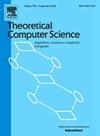Asymptotic analysis of weighted fair division
IF 1
4区 计算机科学
Q3 COMPUTER SCIENCE, THEORY & METHODS
引用次数: 0
Abstract
Several resource allocation settings involve agents with unequal entitlements represented by weights. We analyze weighted fair division from an asymptotic perspective: if items are divided among agents whose utilities are independently sampled from a probability distribution, when is it likely that a fair allocation exist? We show that if the ratio between the weights is bounded, a weighted envy-free allocation exists with high probability provided that , generalizing a prior unweighted result. For weighted proportionality, we establish a sharp threshold of for the transition from non-existence to existence, where denotes the mean of the distribution. In addition, we prove that for two agents, a weighted envy-free (and weighted proportional) allocation is likely to exist if , where denotes the ratio between the two weights.
加权公平除法的渐近分析
一些资源分配设置涉及由权重表示的不平等权利的代理。我们从渐近的角度分析加权公平分配:如果m个项目被分配给n个代理,这些代理的效用从概率分布中独立采样,那么公平分配何时可能存在?我们证明,如果权重之间的比率是有界的,则在m=Ω(nlogn/loglogn)的情况下,有高概率存在加权无嫉妒分配,推广了先前未加权的结果。对于加权比例性,我们建立了一个从不存在到存在过渡的尖锐阈值m=n/(1−μ),其中μ∈(0,1)表示分布的均值。此外,我们证明了对于两个agent,如果m=ω(r),则可能存在加权无嫉妒(加权比例)分配,其中r表示两个权重之间的比率。
本文章由计算机程序翻译,如有差异,请以英文原文为准。
求助全文
约1分钟内获得全文
求助全文
来源期刊

Theoretical Computer Science
工程技术-计算机:理论方法
CiteScore
2.60
自引率
18.20%
发文量
471
审稿时长
12.6 months
期刊介绍:
Theoretical Computer Science is mathematical and abstract in spirit, but it derives its motivation from practical and everyday computation. Its aim is to understand the nature of computation and, as a consequence of this understanding, provide more efficient methodologies. All papers introducing or studying mathematical, logic and formal concepts and methods are welcome, provided that their motivation is clearly drawn from the field of computing.
 求助内容:
求助内容: 应助结果提醒方式:
应助结果提醒方式:


